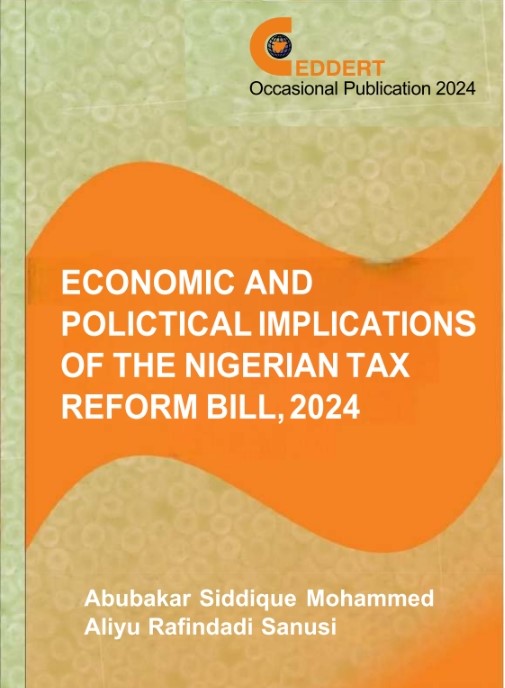By Adagbo Onoja
President Tinubu’s Tax Reform Bill has moved from the law making and popular culture spheres to a subject of intellectual disquisition. Two academics, Abubakar Siddique Mohammed and Aliyu Rafindadi Sanusi of the Zaria based Centre for Centre for Democratic Development Research and Training (CEDDERT) are offering an intertextual insight into the tax bill in a 53 page monograph they have just released. Intertextual insight means that the monograph goes beyond a technicist reading of the bills right into its federal context, its coming at a time of severe deprivations and the context of the reading of the crisis by the Nigerian state.
It is the sort of text that every reader must read personally so as to be able to draw on it either as a protagonist or antagonist of the bill. However, there is a sense in which a paragraph on page 17 says a lot about the book’s standpoint on the tax bills. While framing the bill as an attempt at repealing all subsisting tax laws in Nigeria and some of its institutional arrangements so as to provide a unified fiscal legislation, including states and local governments, it however says that this is such that could have “adverse consequences on individuals’ welfare, the economy and Nigeria’s federalism. It is, therefore, not enough to focus on the objective of the reforms but on the implications of the specific provisions that are injurious to society”.
Much of the monograph draws out such implications, particularly for some existing state institutions such as NASENI, TetFund, NITDA. A good grasp of the implications as drawn out is one of the reasons why it is the sort of text that each reader must consume personally or risk missing the monograph’s many different entry points.
Of course, it hammers the Tinubu government for the sneaky ways of the bill evidenced by it being hidden until NASS journal published them; how the bills are not only such a comprehensive move with the objective of restructuring the economic foundation of Nigeria’s federalism but also audacious in evading the consensus building required for that; what it sees as the temptation to authoritarianism in the presidency’s rejection of the National Economic Counsel’s advise to build such consensus and then its selection of specific key issues around the bill(s).
Going through the text, especially the initial pages, the issue of the bulldozing or resort to the tactic of rushing the passage of the bill comes out prominently. The monograph implies how such temptations strengthen perceptions of hidden agenda behind the bill. That is, while no discourse such as the tax reform bill can ever be without its own hidden agenda – no discourse is ever free of that – the regime is blocking the clash of contending re-inscription of the bill by diverse protagonists and antagonists towards producing a consensus. In doing so, the regime drives the bill to carrying the burden of its own legitimacy crisis. The monograph thus indirectly asks why the regime is so unsure of itself and carelessly advertises such lack of confidence by trying to smuggle bills or intimidate anyone who doesn’t see things its way. The monograph name Senator Ali Ndume as the victim in this case.
One other interrogation of the bill implied across the text is whether the tax reform bill is an original idea of the Tinubu regime or a borrowed rulebook. Remember the idea of ‘tyranny of borrowed paradigms’ in one of the hot debates years back in Nigeria’s Ahmadu Bello University, Zaria. If it is an idea original to the government, how was it possible, for instance, that it did not occur to the masterminds behind replacing point of collection with point of consumption in the sharing formula for vat? No African country has attained the level of technological development to be able to compute consumption details across the land, much less Nigeria which is totally dysfunctional. By how would anyone monitor and compute consumption details in states such as Bayelsa, Ekiti, Yobe, Taraba, Benue and even Lagos as to make point of consumption a central category in that process? Going through the monograph can equally trigger in a critical reader to asking why is abolishing tuition in universities not the option as opposed to the students’ loan strategy favoured in the tax regime?
The monograph editors may have a point in stressing the case for a deeper national debate on the tax reform bill. Such a debate can bring out something beyond the radius of the ideologues of the promoters of the bill. One question Nigeria may end up posing and answering is whether taxation can be an autonomous development strategy. If the answer is yes, Tinubu would have won the 2027 through epistemic leadership because it would mean he does have a strategy. If the answer is No, then he would have lost the 2027 bid many years before 2027 because it means his idea of how to remake Nigeria impresses no one. So, shielding the tax bill from popular debate is a problematic endgame.
What is likely to be the central achievement of the monograph is that it is saying to its readers that the tax reform bill as it is goes beyond whether it is bad or good. What is crucial about it is what Nigerians make of it.




























